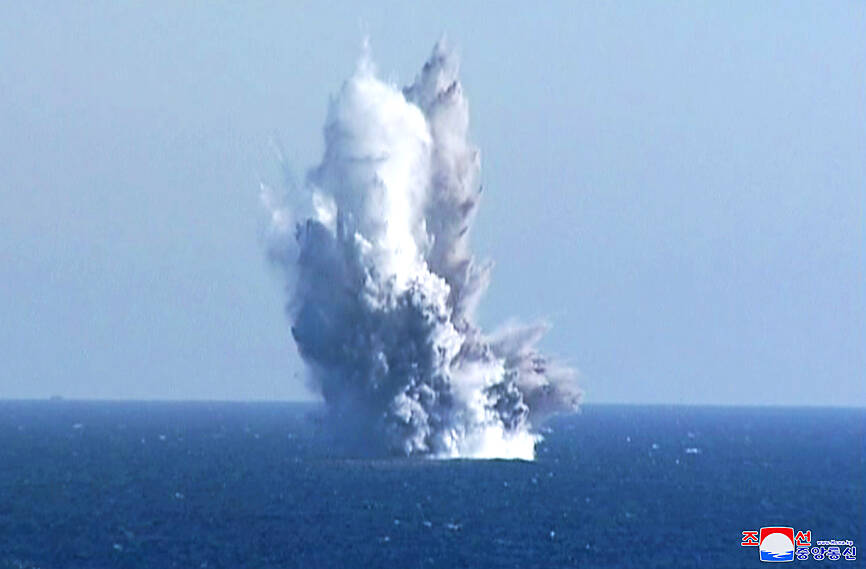North Korea yesterday said it had tested an underwater nuclear attack drone able to unleash a “radioactive tsunami,” as it blamed US-South Korea exercises for a deteriorating regional security situation.
Pyongyang carried out military drills of its own in response this week, including test-firing a new nuclear-capable underwater drone, state media reported.
The weapon’s mission is to “stealthily infiltrate into operational waters and make a super-scale radioactive tsunami ... to destroy naval striker groups and major operational ports of the enemy,” the Korean Central News Agency (KCNA) said.

Photo: EPA-EFE / KCNA
The new weapon, called Haeil, meaning “tsunami” in Korean, “can be deployed at any coast and port or towed by a surface ship for operation,” the report said.
North Korean leader Kim Jong-un oversaw Tuesday’s test, KCNA said, and images released by the daily Rodong Sinmun showed a smiling Kim and what appeared to be an underwater explosion.
The agency also said that Pyongyang on Wednesday fired strategic cruise missiles “tipped with a test warhead simulating a nuclear warhead.”
However, analysts questioned North Korea’s claims.
The idea that Pyongyang has “a nuclear-capable underwater drone should be met with skepticism,” said Leif-Eric Easley, a professor at Ewha Womans University in Seoul.
“Pyongyang’s claims about a new weapons system are not the same as a credible demonstration of capability,” he added.
US-based analyst Ankit Panda wrote on Twitter that it could not be ruled out that the announcement was “an attempt at deception/psyop.”
Even so, the claim was “shocking,” said Cheong Seong-chang, a researcher at the private Sejong Institute.
If true, it is hard to see how Seoul “could respond to such a formidable new weapon from North Korea that [it says] can completely destroy the South’s major operational ports,” Cheong said.
The KCNA statement showed that “Pyongyang is more than ready to use its tactical nuclear weapons at any time,” said An Chan-il, a defector-turned-researcher based in Seoul. “This obviously further strengthens Kim’s justification for his future nuclear tests.”
Russia has reportedly developed a similar weapon — nuclear-capable Poseidon torpedoes — but mastering the complex technology required for such weaponry might yet be beyond North Korea, experts said.
“For an unmanned submarine to go deep underwater undetected, it requires advanced technology such as control sensors and radar,” said Choi Gi-il, a professor of military studies at Sangji University in Wonju, South Korea.
North Korea has not acquired this “to an extent that it can deploy nuclear unmanned sea drones in combat yet,” but its claims about the Haeil drone fit a broader pattern, Choi said.
Pyongyang has moved on from simply stockpiling nuclear warheads and is “attempting to further advance and diversify launch mediums,” Choi said, adding that further testing could yet give the North Korean military “formidable” new ways to deliver a nuclear payload.

‘ABUSE OF POWER’: Lee Chun-yi allegedly used a Control Yuan vehicle to transport his dog to a pet grooming salon and take his wife to restaurants, media reports said Control Yuan Secretary-General Lee Chun-yi (李俊俋) resigned on Sunday night, admitting that he had misused a government vehicle, as reported by the media. Control Yuan Vice President Lee Hung-chun (李鴻鈞) yesterday apologized to the public over the issue. The watchdog body would follow up on similar accusations made by the Chinese Nationalist Party (KMT) and would investigate the alleged misuse of government vehicles by three other Control Yuan members: Su Li-chiung (蘇麗瓊), Lin Yu-jung (林郁容) and Wang Jung-chang (王榮璋), Lee Hung-chun said. Lee Chun-yi in a statement apologized for using a Control Yuan vehicle to transport his dog to a

Taiwan yesterday denied Chinese allegations that its military was behind a cyberattack on a technology company in Guangzhou, after city authorities issued warrants for 20 suspects. The Guangzhou Municipal Public Security Bureau earlier yesterday issued warrants for 20 people it identified as members of the Information, Communications and Electronic Force Command (ICEFCOM). The bureau alleged they were behind a May 20 cyberattack targeting the backend system of a self-service facility at the company. “ICEFCOM, under Taiwan’s ruling Democratic Progressive Party, directed the illegal attack,” the warrant says. The bureau placed a bounty of 10,000 yuan (US$1,392) on each of the 20 people named in

The High Court yesterday found a New Taipei City woman guilty of charges related to helping Beijing secure surrender agreements from military service members. Lee Huei-hsin (李慧馨) was sentenced to six years and eight months in prison for breaching the National Security Act (國家安全法), making illegal compacts with government employees and bribery, the court said. The verdict is final. Lee, the manager of a temple in the city’s Lujhou District (蘆洲), was accused of arranging for eight service members to make surrender pledges to the Chinese People’s Liberation Army in exchange for money, the court said. The pledges, which required them to provide identification

INDO-PACIFIC REGION: Royal Navy ships exercise the right of freedom of navigation, including in the Taiwan Strait and South China Sea, the UK’s Tony Radakin told a summit Freedom of navigation in the Indo-Pacific region is as important as it is in the English Channel, British Chief of the Defence Staff Admiral Tony Radakin said at a summit in Singapore on Saturday. The remark came as the British Royal Navy’s flagship aircraft carrier, the HMS Prince of Wales, is on an eight-month deployment to the Indo-Pacific region as head of an international carrier strike group. “Upholding the UN Convention on the Law of the Sea, and with it, the principles of the freedom of navigation, in this part of the world matters to us just as it matters in the